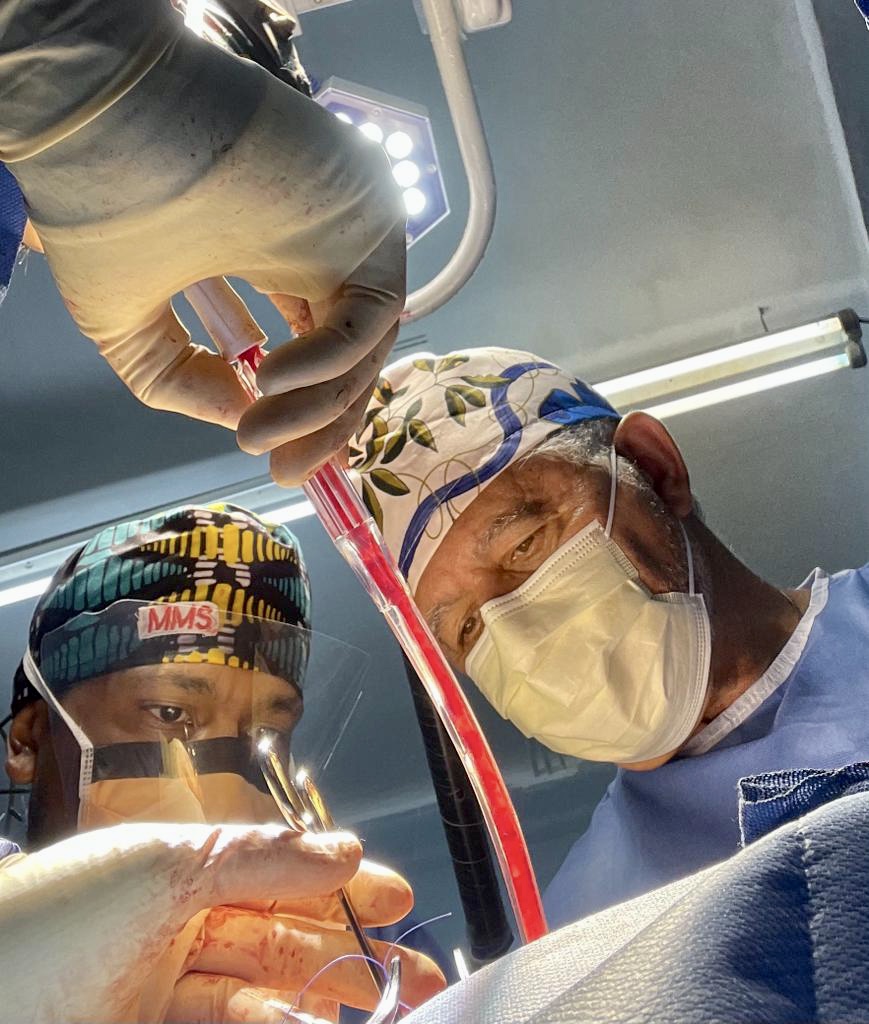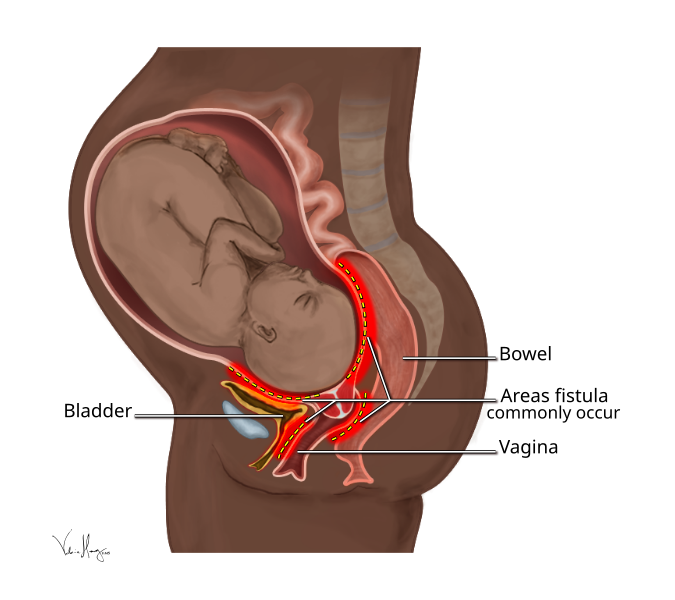What is Fistula?
Obstetric fistula is a devastating childbirth injury. It leaves a woman incontinent, humiliated, and—all too often—shunned by her community. Surgery is the only cure.

Today, at least one million women in Africa and Asia suffer from untreated fistula.
How Fistula Occurs
An obstetric fistula is a medical condition that occurs during childbirth when there is a hole or opening between the birth canal and an internal organ, such as the bladder or rectum. This hole can develop as a result of prolonged or obstructed labor, often in settings where access to emergency obstetric care is limited. The most common type of fistula in obstetrics is a vesicovaginal fistula (VVF), which involves a hole between the bladder and the vagina.
During prolonged labor, the pressure and lack of blood flow to the tissues between the baby’s head and the mother’s pelvic bone can cause the tissues to break down and form a hole. This can lead to the leakage of urine or feces into the vagina, resulting in incontinence. Women with obstetric fistulas often experience not only physical health issues but also social isolation and stigma due to the odor and constant leakage associated with the condition.

Obstetric fistulas are more common in regions with limited access to obstetric care, where women may not have timely access to medical interventions, such as cesarean sections, to address complications during childbirth. The condition is largely preventable with proper medical care and access to skilled birth attendants.
Surgical repair is the primary treatment for obstetric fistulas. However, the success of the repair may depend on the extent of the injury, the woman’s overall health, and the availability of postoperative care. In addition to medical treatment, efforts are made to address the social and psychological aspects of the condition, including rehabilitation and reintegration into communities. Public health initiatives also focus on preventing obstetric fistulas through improved access to maternal healthcare services, family planning, and education
How Untreated Fistula Impacts a Woman’s Life
Under these circumstances, a woman with a fistula or a severe tear faces devastating physical and psychological consequences. Unable to control the leaking of her body’s waste, she suffers with chronic infections and pain. Too often, her smell drives away her husband, family and friends.
With little community understanding of her injury and its causes, a woman is frequently blamed for her condition. She too often lives in isolation, unaware that others share her injury and that it is treatable. If the fistula or severe tear occurs during a woman’s first pregnancy—when she is in her teens or early twenties—she will suffer for decades, if it is not repaired.
Yes. Corrective surgery provides effective treatment for women suffering from an obstetric fistula or a severe perineal tear. If the operation is performed by a skilled surgeon, a woman with either of these childbirth injuries can very often return to a normal life, with her continence and hope restored.
Fistula commonly occurs to women in their early twenties, in countries where the average life span is approximately 65 years—meaning a one-time surgical intervention can restore 40+ years of health.
Even though obstructed labor occurs in approximately 5% of all child births worldwide, obstetric fistula has largely been eradicated in wealthy countries, thanks to the advent of the Cesarean section in the early 1900s.
Today, fistula persists in low-income countries where women have limited access to emergency obstetric care. It continues to destroy women’s lives at an alarming rate in poor, rural regions of Africa and Asia, where fewer than 6 out of 10 women give birth with a medical professional present.
Perineal tears commonly occur during vaginal childbirth around the world. Small tears can heal on their own with proper management. For women who have access to quality care during childbirth, a severe tear can be prevented or can immediately be diagnosed and treated. It is unlikely a woman in a wealthy country would live with an untreated tear.
An obstetric fistula occurs when a mother has a prolonged, obstructed labor, but cannot access emergency medical care, such as a C-section. It is a symptom of deep, intractable poverty and the low status of women and girls.
In poor countries, many children are malnourished, which can stunt their growth. If a young mother’s pelvis is not fully mature, she is at an increased risk of experiencing an obstructed labor—and with it, devastating childbirth injuries like obstetric fistula. The practice of early marriage and young pregnancy can additionally compound this risk.
Another cause of fistula is a critical lack of doctors and medical facilities. In poor, rural regions of Africa and Asia, fewer than 6 out of 10 women give birth with a medical professional present.
Why Are Women Still Suffering?
Women in Africa and Asia are needlessly suffering today for want of a single surgery that can completely transform their lives.
Fistula repair surgery was a common practice in western nations in the late 1800s. With the advent of C-sections, fistula has been largely eradicated from wealthy countries. While perineal tears still commonly occur in wealthy nations, prevention and treatment are readily available and women rarely suffer at home.
Living in rural parts of Africa and Asia, women with untreated fistula or severe perineal tears are some of the world’s most vulnerable individuals. The MMS Foundation exists to remove all barriers to treatment so that every woman can have access to high-quality care.
You Can Transform a Woman's Life
- With only $25 you give a woman the essential goods for her hospital stay
- With $50 you provide her transportation from her village to the hospital
- With $75 you feed a patient for a week
- With $150, you give a woman all the medication that she needs for her surgery and recovery
- With $2500, you allow one of our volunteer doctors to travel to Africa for the next mission
